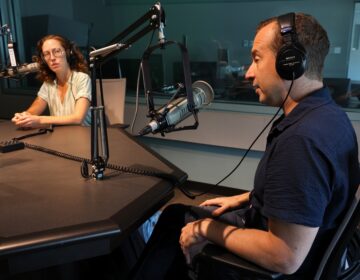NPR’s ‘Hidden Brain’ celebrates a decade of examining life’s unseen patterns
Vedantam, a veteran science reporter, joins WHYY’s Jennifer Lynn to explore how unseen mental forces shape our choices, and why the show continues to resonate with listeners.
Listen 7:14
Hidden Brain
From Philly and the Pa. suburbs to South Jersey and Delaware, what would you like WHYY News to cover? Let us know!
NPR’s “Hidden Brain,” hosted by Shankar Vedantam, is marking its 10th anniversary.
The show airs on WHYY 90.9 FM on Sundays at 1 p.m. EST and is also available as a podcast on NPR, Apple Podcasts and Spotify.
“Hidden Brain” examines how unconscious patterns influence human behavior, and WHYY “Morning Edition” host Jennifer Lynn spoke with Vedantam about the milestone, beginning with the question: “Have you found the brain?”
Shankar Vedantam: Well, there is the brain, and then there is the brain, Jennifer. So I think there’s the brain that we all know and we’re familiar with. When I think about my own mind right now, it feels like I’m aware of everything that’s happening inside my own head. But what I’ve learned over the last 20 years is that, in some ways, this is a very powerful illusion — the illusion that we seem to know our own minds. In fact, this is not real.
There’s so much of our minds that is hidden from us on a constant basis, and that’s really the origin of the term “Hidden Brain” and the origin of many, many of our episodes.
Jennifer Lynn: So “Hidden Brain” refers to our mental processes that we’re unaware of. The show brings us conversations about life’s unseen patterns. So, in a nutshell, for people who aren’t familiar with thinking about these things, how would you describe that best?
SV: When you think about your mind, Jennifer — when I think about mine — it feels like I’m aware of everything that’s happening. I’m aware that I’m talking with you right now. I’m aware that I’m sitting in a studio. I’m aware that we’re having a conversation. But it turns out there are many, many things that our minds are doing — that, in fact, they have to do for us to be having this conversation.
For example, I’m not quite aware of how my mind is taking ideas and turning them into words that I’m able to speak to you. How does my mind do that? It’s clearly doing it right now because I’m talking to you.
How does your mind take in sound signals from your ear and convert them into sentences and meaning and syntax — and basically produce meaning out of that? You’re clearly doing that because you’re understanding what I’m saying, but you really don’t have any understanding of how your brain is doing this.
So that’s a trivial example, in some ways, of the things that our brains are doing behind the scenes. One metaphor that I like to use is that all of us have been to theaters or to shows. There’s the stuff that’s happening on the stage — that’s front of stage.
But all of us know that in order to have the stuff happen on the stage, there’s a whole host of things that are happening backstage. And the brain is exactly the same way. There are things that are happening on the stage, but it turns out there’s a huge range of things happening backstage.
JL: I really like that. What is a throughline that you have used over the life of the show to explain how the unconscious mind guides our behaviors and decisions?
SV: I think what’s similar is that we have, again, this illusion that what’s happening on the front of stage is all that actually is going on. And what we see over and over again — whether it comes to the choices we make in finding a career, our decision to marry someone, our decision to divorce someone, our decision to vote for a presidential candidate, our decision of what to buy at the supermarket, a decision of what to order in a restaurant.
It turns out that for every one of these decisions, there is a huge host of factors behind the scenes that’s weighing on our decisions. Marketers, in some ways, have figured out some of these things. Politicians have figured out some of these things. They know how to pull the strings of what’s happening backstage in our heads in order to change our judgments and decisions.
JL: Well, what do you think our brain is really up to when it comes to, let’s say, political beliefs? Creation of political allies and opponents? I know you’ve done a show on this. What’s your take?
SV: Our minds are really the product of a long process of evolution. And in that long process of evolution, our ancestors faced a whole bunch of challenges, and our minds, in some ways, evolved to cope with those challenges.
One of the challenges that our ancestors faced was the threat of predators or the threat of people from other groups attacking them. And so our brains have learned, over these many millions of years of evolution, to pay very close attention to our groups — to pay attention to who’s in our in-group and who’s in our out-group.
Now, it turns out those same algorithms that served our ancestors very well might not serve us very well in the early 21st century. It might not actually be so useful to imagine that we’re part of one tribe and that we’re at war with this other tribe. But if you think about the politics of the United States today, it feels very tribal. People feel so strongly about their political parties that they don’t want their children marrying somebody who’s from another political party, right?
It feels so intense, and in some ways this is the ancient algorithms in the hidden brain hijacking us and causing us to be at more conflict than we need to be.
JL: How have the show’s topics — occasionally, frequently or never — changed how you live your own life?
SV: I actually think that with every single “Hidden Brain” episode, there’s a lesson that I take away and I tell myself, I need to remember to do this. I need to remember to be calmer when I’m angry. I need to be more patient when I’m impatient. I need to look at things from somebody else’s point of view. I need to make sure that I’m kinder to people as I’m interacting with them.
Now, I will say, I don’t always remember to do these things — I have an intention to do these things. I’ve actually been doing a live tour this year, and we’re going to bring the tour to Philadelphia, actually, in March next year.
But one of the things that we talk about in the tour is this gap between what we know we should do and what we end up doing — and why it is this gap comes about. That we know that we should be kinder, gentler, wiser, calmer people, but in practice, we often fail to do those things.
JL: And I want to talk about relevance before we have to call it quits today, the relevance of this show. What’s the secret to “Hidden Brain’s” longevity on the air? How do you stay on the air?
SV: I think the secret to our longevity is that, at some point, as people are listening to our show, they’ve actually stopped listening to the show — and they’re listening to their own lives.
So, in other words, one of the things that I tell my colleagues is that what I want the show to be is, I want the show to be the soundtrack to the lives of the people who are listening to the show.
I want them to be listening to their own lives, asking about their own relationships, asking about their own minds. To become curious about themselves. We talk about many of these ideas in the live tour. As I said again, we’ll be bringing the show to Philadelphia on March 21 next year.
JL: Well, if you need help with the live tour, I know someone who could introduce you. Thank you.
SV: That’ll be wonderful.

Get daily updates from WHYY News!
WHYY is your source for fact-based, in-depth journalism and information. As a nonprofit organization, we rely on financial support from readers like you. Please give today.






